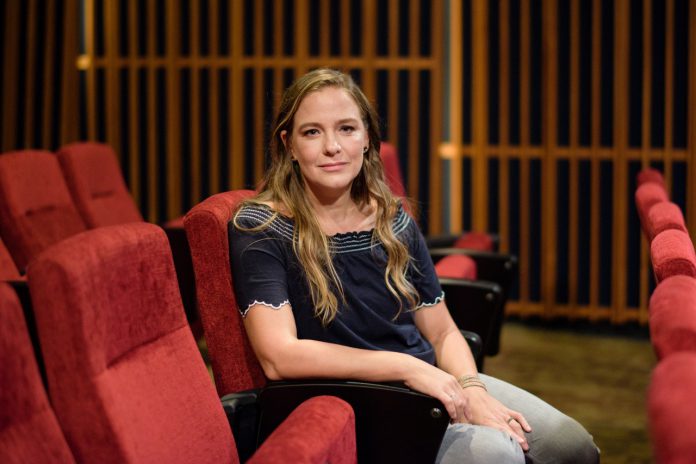Documentary director Joanna Bowers talks about her film projects, her values, and her goals as a filmmaker.
By Patricia Ricafort
Coming to Hong Kong
While some local directors are stepping out of Hong Kong, Joanna Bowers moved here to embark on her career in film. In 2017, she produced a documentary, The Helper, which follows the lives and struggles of domestic helpers in Hong Kong.
In 2011, while Bowers was in Los Angeles, her friend, who was moving to Hong Kong, convinced Bowers to accompany her to help with finding an apartment. While she was in Hong Kong, she met the CEO of a manufacturing company, who gave her a directing opportunity that kept her here.
Now, almost ten years after she first moved to Hong Kong, she sees herself staying here. “I think there’s a lot more opportunities in Hong Kong. Hong Kong has a certain vibrancy and grittiness, and there are many unique things about Hong Kong that are interesting and attractive,” she says.
She believes that living in Hong Kong has allowed her to discover and explore unique stories that she would not have been able to access if she was living elsewhere.
First Time as a Director
Before that, the first directing opportunity came to Joanna Bowers unexpectedly. In 2009, her friend Maureen Ganz had written a short film, Inviolate Rose, and he approached Bowers to direct it.
“After my first day on set, working on this short film, I realised I love it! This is brilliant!” she says.
Inviolate Rose is based on a true story of Maureen Ganz and her two sisters, who travelled to Ireland to scatter their mother’s ashes after her death from cancer.
Prior to directing her first film, she never believed that a woman could become a director.
“I remember, years ago, seeing Jane Campion’s film The Piano that was nominated for the Oscar, and I remember being really taken aback. It hadn’t occurred to me that it was possible for a woman to be a director of a film at that level,” she says.

An Untold Story
“I strive to tell those stories that haven’t been told before to help the person that has been overlooked to get their perspective out in the world,” says Bowers. “The more diversity and different perspectives we can understand, the better for us.”
Bowers once co-wrote a romantic comedy featuring an interracial relationship between a Caucasian woman and an Asian man. While she was able to get funding for the film, she had a hard time finding a distribution company because the lead in her story is an Asian male.
“When my producers went to the Cannes Film Festival to try and get some pre-sales on the film, they came back to me and said, ‘We’re having a difficult time selling this film because it’s got an Asian male romantic lead. Nobody seems to want to buy that. How about this: what if, he’s not Asian, he’s Caucasian but grew up in Hong Kong?’”
Bowers refused. “That defeats the entire purpose of what the whole story’s about!” she says.
While that film was never executed, she was able to produce her feature documentary, The Helper, and released it in 2017. The documentary follows the lives and struggles of domestic helpers in Hong Kong.
Bowers made it after realizing that nobody had made a film exploring their lives. “I became fascinated by how important they were yet how unseen and unknown their stories were. I wanted to put them on a platform where they would be appreciated and be seen,” she says.
The Helper fits in well with Bowers’ interest in telling women’s stories. “As I’ve progressed as a director, I’ve become more and more conscious of how underrepresented women’s stories are within the media,” she adds.

“As I’ve progressed as a director, I’ve become more and more conscious of how underrepresented women’s stories are within the media”
Life before directing and Hong Kong
Growing up in Kent, U.K., Bowers did not even think she would work in the creative industries. She initially selected her GCE A-level subjects on the premise that she was going to study medicine in university. “I thought I was going to be a heart surgeon!” she says.
Yet she quickly realised that the sciences were not suitable for her, so she decided to pursue a more creative career.
Bowers studied broadcast journalism at university. While she enjoyed learning about writing and video production, she realised that hard news was too dark and depressing for her.
Instead, she set her sights on the entertainment industry. She planned to move to Los Angeles as a university student after seeing opportunities available there.
“If I want to be in this industry, rather than being in the UK, which, at the time, had maybe four or five channels, there’s much more work and opportunity being in Los Angeles,” she says.
Her directing career in Los Angeles, however, was short-lived. Soon after releasing her short film, the effects of the financial crisis reached her. As a new, inexperienced director, she found herself out of work.
“My work disappeared, and it was awful for me. I had finally figured out this role in the industry that I loved,” she recalls.
Looking ahead
While her first feature film is a documentary, Bowers also hopes to direct narrative film in the future. At the same time, she aims to continue increasing awareness of critical issues through documentary filmmaking.
She is in the final stages of making a documentary called Refashioned, profiling three Hong Kong people aiming to promote sustainable fashion in various ways. “The world’s changing. I watch people like Greta Thunberg, and they make you realize how much of an emergency we are facing,” she says.
“You want to make the world a better place for your children to grow up in, and I feel like making films is my attempt at doing that.”
Edited by Lambert Siu
Sub-edited by Jasper Cao







































